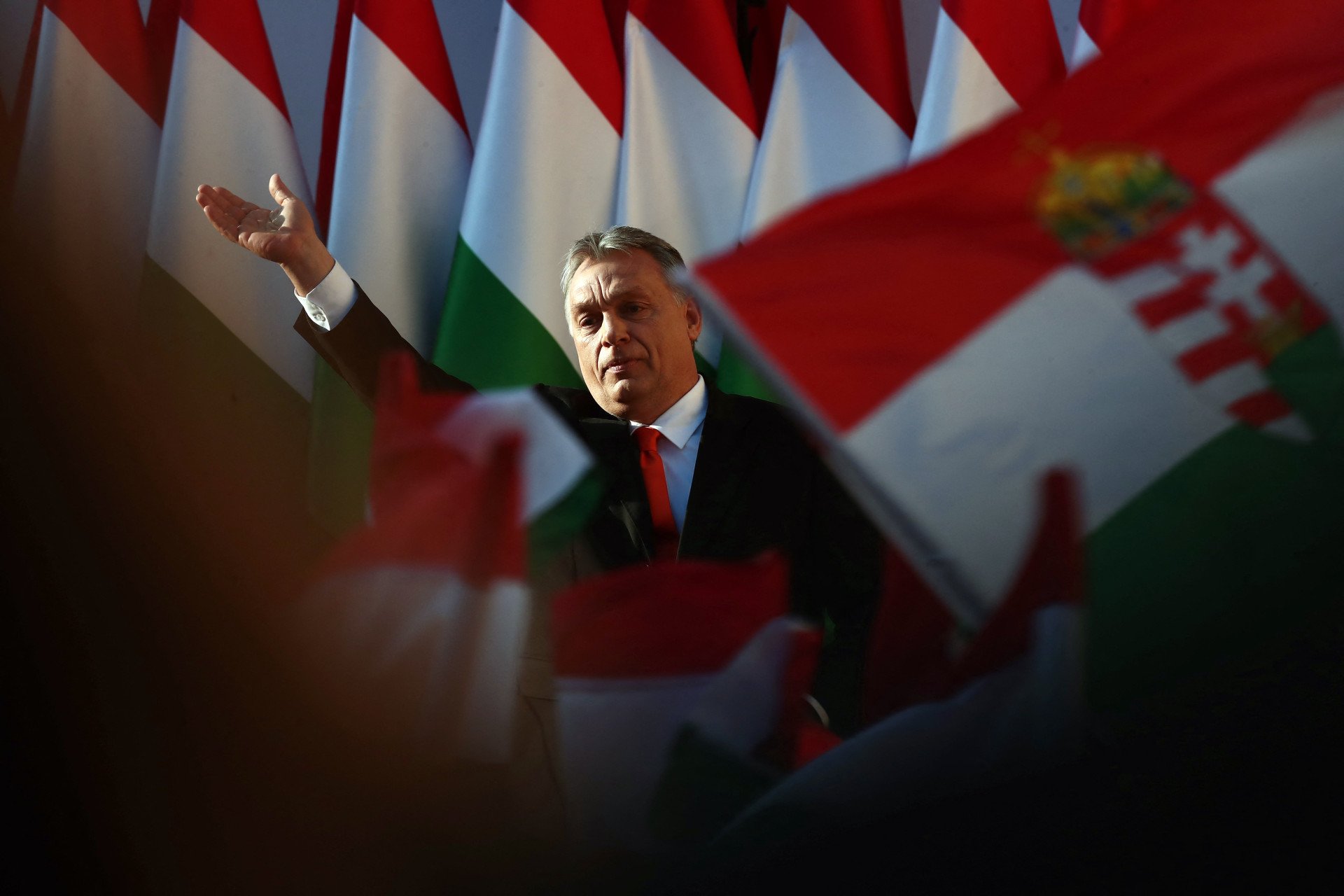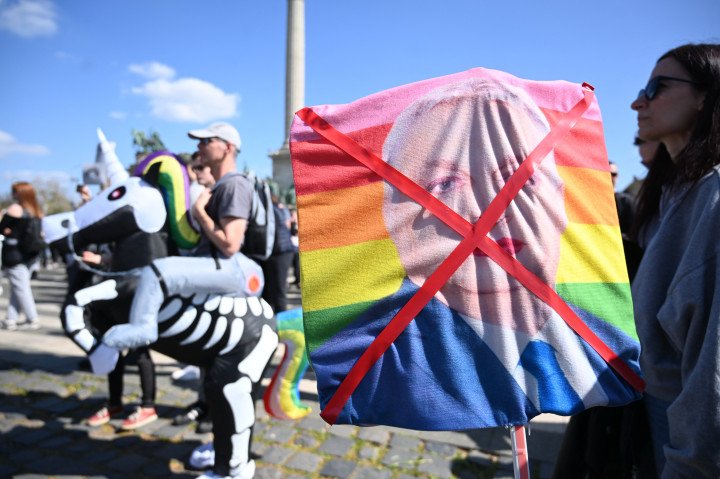- Category
- World
The Rise, Rule, and Shift of Hungarian PM Viktor Orbán, Explained

Once a reformer who stood against Soviet influence and championed national sovereignty, Hungarian Prime Minister Viktor Orbán has embraced Kremlin-style authoritarianism, mirroring the very centralized control he once opposed.
When Viktor Orbán became one of Europe’s youngest prime ministers in 1998, he promised freedom, democracy, and a new future for Hungary. But after over a decade in power, he became known for repeatedly attacking the EU, aligning himself with Putin more closely than any other EU leader, and building his election campaign on demonizing Ukraine.
Now, those tactics include espionage. Hungarian agents have been gathering sensitive data on Ukraine’s defense infrastructure, including the locations of S-300 air defense systems and military deployments, Ukrainian intelligence reported. Ukraine’s President Volodymyr Zelenskyy condemned these actions as repeated attempts to interfere in Ukraine’s domestic affairs, accusing Budapest of exploiting Russia’s war for political gain at home.
For a leader who once stood for liberty, the transformation has been stark. Since 2010, Orbán has turned Hungary into what the European Parliament has called a "hybrid regime of electoral autocracy."
Orbán’s rise to power
Some call Viktor Orbán a “man of chaos,” others describe him as “a very intellectually smart individual.”
He grew up in a small Hungarian village without running water, developed a passion for football, and went on to study at university before completing military service. During that time, he was reportedly approached by the communist secret police to become an informer—a request he rejected. He went on to study liberal political philosophy briefly at the UK’s Oxford University.
Orbán’s political ascent began in the late 1980s, as the Soviet Union began to fall apart. He set up a political movement called Fidesz, or Alliance of Young Democrats.
In 1989, Orbán delivered a speech telling the Soviet Red Army to go home. Orbán played a central role in calling for the withdrawal of Soviet troops and in guiding Hungary's shift to a democracy and a free market economy.
If we believe in our own power, we are able to finish the communist dictatorship.
Viktor Orbán
Orbán’s party joined the global Liberal International movement in 1992 after he rose to the top of his Fidesz party, which had already gained seats in parliament. In 1993, he became his party's leader and, several years later, one of Europe's youngest prime ministers, taking Hungary into NATO in 1999.
Ukraine, Orbán’s favorite scapegoat
Fast forward to 2025, ahead of Hungary’s 2026 parliamentary elections, Orbán has made Ukraine the centerpiece of his campaign. Billboards in Budapest feature President Volodymyr Zelenskyy’s face beside the slogan, “Let’s not allow them to decide for us.”

“I did not give consent to use my face,” Zelenskyy said. “I am the president of another country. This is not ethical.” Further adding that Orbán's anti-Ukrainian sentiment “does a favor to Putin.”
Orbán’s government has launched an aggressive campaign against Ukraine’s EU accession, suddenly portraying the country as a “center of drug trafficking and organized crime in Eastern Europe." In a mass questionnaire—Vox 2025—sent to eight million households, Hungarians were urged to reject Ukraine’s membership bid, with Orbán claiming it would mean spending “all Hungary’s money on Ukraine.”
💸 While Brussels burns €140 billion on a failed war in Ukraine, Hungary chose a different path.
— Orbán Viktor (@PM_ViktorOrban) May 3, 2025
We adopted Europe’s largest tax cut programme:
👩🍼 Mothers with 3+ children: lifelong income tax exemption
👶 From Jan 1: mothers under 40 with 2 children = tax-free
➡️ Step by step,… pic.twitter.com/XRuhIiBxO7
Fidesz has gone further, accusing the opposition Tisza party of being “bought” by Zelenskyy to topple the government—a claim tied to Orbán’s slipping poll numbers. Tisza leader Péter Magyar is now seen as an “existential threat” to Orbán’s rule.
Viktor is making a serious, historic mistake.
President of Ukraine
Orbán’s election campaign became a campaign against Ukraine: a mix of domestic politics, geopolitical opportunism, and ideological alignment. By focusing on foreign issues, Orbán diverts attention from issues within his own government.
“Positioning Ukraine as a central campaign issue, Fidesz hopes to consolidate its shaken voter base, retake the initiative from Magyar, and attract third-party and independent voters to support the ruling bloc as Ukraine-Hungary relations remain a contentious issue,” researchers at the Jamestown Foundation said.
However, the leader of the Tisza party, Péter Magyar, is consistently ahead of Orbán in independent polls. With Orbán’s grip on power threatened, analysts warn Orbán may resort to electoral fraud to win re-election—and reportedly risk “investigation proceedings and imprisonment for corruption and abuse of office.”
How did Orbán go from, as Hungarian-born veteran and journalist Paul Lendvai said, "one of the most promising defenders of Hungarian democracy” to “the chief author of its demise”?
Hungary’s shift to authoritarianism
Although Orbán suffered two political defeats in 2002 and 2006, he was swept back into office in 2010 and has remained in power since then.
The EU, NATO, and the Council of Europe have condemned Orbán’s authoritarian regime, though little has stopped its growth. Hungary is a founding member of the International Criminal Court (ICC), but in April 2025, it announced that its government is withdrawing from it. This came hours after Israel's leader, Benjamin Netanyahu, who is sought under an ICC arrest warrant for war crimes, arrived in Hungary for a state visit. Russia is also not part of the ICC, making accountability for war crimes difficult.
Everything has fallen apart in Hungary. The state essentially does not function, there’s only propaganda and lies.
Orbán's opposition - Respect and Freedom (Tisza) party
The Tenth Amendment
Hungary’s so-called “Tenth Amendment” was adopted in 2020, which expanded the government’s ability to declare a “state of danger”—a form of emergency rule. This amendment has been criticized for giving Orbán’s government sweeping powers with limited oversight, raising concerns about democratic backsliding and the consolidation of power under the guise of crisis management. “State of danger” severely restricts the fundamental rights to gather, discuss, protest, and demonstrate.
Judicial independence
In 2018, Fidesz passed a new law creating a separate administrative court system that will handle cases directly affecting basic human rights, such as elections, right to asylum, right to assembly, and complaints of police violence.
The minister has the power to choose judges without any judicial oversight, which Human Rights Watch says is “a mockery of the separation of powers and rule of law.” Orbán’s government had already forced more than 400 judges into retirement to place its own preferred justices.
Russia’s judges in its judicial system “consider themselves an extension of law enforcement and aides to the police,” Carnegie Endowment reported. Supreme Court records show that a judge renders a not-guilty verdict once every seven years.
“We see that the system doesn’t need outside experience; it doesn’t need experienced lawyers. It needs efficient personnel who know how to follow orders,” Carnegie Endowment said. Orbán's government seems to be following in Russia’s footsteps, taking control of cases that it deems to be a threat to Hungary, and in turn, a threat to democracy.
Nationalist, xenophobic, and homophobic rhetoric
Orbán has gained power using false xenophobic narratives that cater to White supremacists, using the Great Replacement Theory, stating that White people will be replaced by other races and must therefore reproduce in order to avoid replacement, Human Rights Research stated.
Hungary has banned LGBTQ+ rights, portraying “divergence from self-identity corresponding to sex at birth, sex change or homosexuality” as prohibited on the grounds of “child protection”. Hungary’s Pride march was due to be held in Budapest at the end of this month, June 2025, but the event has been prohibited.
The organizers called it "a textbook example of tyranny”, and the country's new law is seen as one of many of Hungary’s Russian-style crackdowns on dissent.

Orbán declared in 2022 that he doesn’t want Hungary to become “people of mixed race.”
Human Rights Research highlights how Orbán’s regime persecutes and oppresses certain groups:
Romani people have been discriminated against in healthcare, education, and employment.
Organizations that protest xenophobia have been censored and attacked. Immigrants have been caged, deprived of food and water, and denied citizenship.
Orbán’s regime introduced a bill excluding trans women from a women-only pension plan.
Orbán has imposed “Child protection laws” against minors viewing LGBTQ+ content.
Abortion access has been restricted
Women's rights are “family affairs” and are determined by government policy.
Women are paid to have children in Hungary.
Civil society crackdown
Orbán pledged in March 2025 to "eliminate the whole shadow army" of NGOs, journalists, judges, and politicians, referring to organisations receiving foreign funding. Fidesz submitted a new legislation drawing up a list of foreign-funded legal entities whose activities are considered to be a threat.
NGOs and watchdogs have faced hostile legislation since 2017, when Fidesz brought in the “foreign agents law,” creating a “black sheep” list modeled on Russian tactics. This law surveils, discredits, and restricts groups critical of the government, specifically those receiving foreign funding.
Any organisation could be listed under Hungary’s latest legislation if it's deemed to "undermine Hungary’s independent, democratic and rule-of-law-based character.” Family, marriage, and biological sexes also constitute a threat to Orbán's government.
Russia first adopted its “foreign agents” law in 2012, which has led to stifling dissent and a wave of arbitrary arrests. Hungary’s latest bill “follows the Russian playbook," Budapest mayor Gergely Karacsony said.
Hungarian Authorities use Pegasus spyware, whereby several hundred individuals, including journalists, lawyers, and politicians, were subject to secret surveillance.
Europe’s top court ruled that Hungary violated EU law in 2017 by targeting foreign universities, forcing out Central European University (CEU), founded by liberal philanthropist George Soros.
The government framed it as an academic issue, but it is part of a broader smear campaign against Soros. Which is often laced with antisemitic and conspiratorial rhetoric due to his Jewish heritage and support for liberal causes. This attack was widely seen as an attack on academic independence and freedom.
State control of the media
Since his re-election, Orbán and Fidesz have systematically worked to establish control of the media.
Orbán has created “an almost Orwellian environment” where the government weaponizes control of a majority of news outlets to limit Hungarians’ decisions, according to Péter Krekó, an analyst and head of the Political Capital think tank in Budapest.

Orbán was put on the “press freedom predators” list in 2021 by Reporters Without Borders (RSF), the first EU leader to earn the distinction. More than 80% of Hungary’s media landscape is controlled by Orbán. Hungary’s Media Council, whose primary function is to ensure democratic, fair, and balanced media, is exclusively made up of persons proposed by Fidesz.
In 2018, nearly 500 pro-government media outlets were handed over in a single move to a foundation controlled by Orbán allies, forming Hungary’s largest right-wing media bloc. The Media Council declined to renew the licences of independent radio stations Klubrádió in 2020 and Tilos Rádió in 2022, which the Council of Europe said is highly concerning.
Throughout a 30-day period from May to June 2024, Hungary was the biggest spender on political advertisements on platforms owned by Facebook’s parent company, Meta, at nearly $4.8 million, according to reports.
Following the Russian model, [the Hungarian government] controls state media by hand and spends about 50 billion forints ($135 million) a year on advertisements … that sustain their own TV networks and websites. The people that consume those media simply don’t hear about these things.
Hungarian Independent Lawmaker
Office for Democratic Institutions and Human Rights (ODIHR) highlighted Orbán's lack of transparency and insufficient oversight of campaign finances, as well as a lack of balance in monitored news coverage, significantly limiting voters’ opportunity to make an informed choice.
-46f6afa2f66d31ff3df8ea1a8f5524ec.jpg)

-605be766de04ba3d21b67fb76a76786a.jpg)
-2c683d1619a06f3b17d6ca7dd11ad5a1.jpg)


-661026077d315e894438b00c805411f4.jpg)